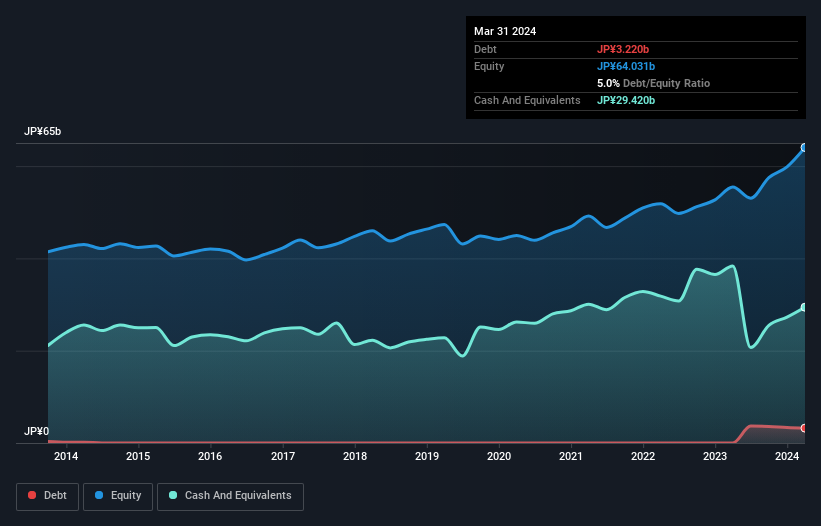Legendary fund manager Li Lu (who Charlie Munger backed) once said, 'The biggest investment risk is not the volatility of prices, but whether you will suffer a permanent loss of capital.' It's only natural to consider a company's balance sheet when you examine how risky it is, since debt is often involved when a business collapses. We note that NSD Co., Ltd. (TSE:9759) does have debt on its balance sheet. But the real question is whether this debt is making the company risky.
Why Does Debt Bring Risk?
Generally speaking, debt only becomes a real problem when a company can't easily pay it off, either by raising capital or with its own cash flow. In the worst case scenario, a company can go bankrupt if it cannot pay its creditors. However, a more usual (but still expensive) situation is where a company must dilute shareholders at a cheap share price simply to get debt under control. Of course, debt can be an important tool in businesses, particularly capital heavy businesses. The first thing to do when considering how much debt a business uses is to look at its cash and debt together.
See our latest analysis for NSD
What Is NSD's Net Debt?
As you can see below, at the end of March 2024, NSD had JP¥3.22b of debt, up from none a year ago. Click the image for more detail. But it also has JP¥29.4b in cash to offset that, meaning it has JP¥26.2b net cash.

How Healthy Is NSD's Balance Sheet?
The latest balance sheet data shows that NSD had liabilities of JP¥14.5b due within a year, and liabilities of JP¥7.83b falling due after that. Offsetting these obligations, it had cash of JP¥29.4b as well as receivables valued at JP¥19.4b due within 12 months. So it actually has JP¥26.4b more liquid assets than total liabilities.
This surplus suggests that NSD has a conservative balance sheet, and could probably eliminate its debt without much difficulty. Simply put, the fact that NSD has more cash than debt is arguably a good indication that it can manage its debt safely.
Also positive, NSD grew its EBIT by 21% in the last year, and that should make it easier to pay down debt, going forward. There's no doubt that we learn most about debt from the balance sheet. But ultimately the future profitability of the business will decide if NSD can strengthen its balance sheet over time. So if you're focused on the future you can check out this free report showing analyst profit forecasts.
Finally, a company can only pay off debt with cold hard cash, not accounting profits. NSD may have net cash on the balance sheet, but it is still interesting to look at how well the business converts its earnings before interest and tax (EBIT) to free cash flow, because that will influence both its need for, and its capacity to manage debt. Over the most recent three years, NSD recorded free cash flow worth 72% of its EBIT, which is around normal, given free cash flow excludes interest and tax. This cold hard cash means it can reduce its debt when it wants to.
Summing Up
While we empathize with investors who find debt concerning, you should keep in mind that NSD has net cash of JP¥26.2b, as well as more liquid assets than liabilities. The cherry on top was that in converted 72% of that EBIT to free cash flow, bringing in JP¥12b. So we don't think NSD's use of debt is risky. Over time, share prices tend to follow earnings per share, so if you're interested in NSD, you may well want to click here to check an interactive graph of its earnings per share history.
Of course, if you're the type of investor who prefers buying stocks without the burden of debt, then don't hesitate to discover our exclusive list of net cash growth stocks, today.
Valuation is complex, but we're here to simplify it.
Discover if NSD might be undervalued or overvalued with our detailed analysis, featuring fair value estimates, potential risks, dividends, insider trades, and its financial condition.
Access Free AnalysisHave feedback on this article? Concerned about the content? Get in touch with us directly. Alternatively, email editorial-team (at) simplywallst.com.
This article by Simply Wall St is general in nature. We provide commentary based on historical data and analyst forecasts only using an unbiased methodology and our articles are not intended to be financial advice. It does not constitute a recommendation to buy or sell any stock, and does not take account of your objectives, or your financial situation. We aim to bring you long-term focused analysis driven by fundamental data. Note that our analysis may not factor in the latest price-sensitive company announcements or qualitative material. Simply Wall St has no position in any stocks mentioned.
Have feedback on this article? Concerned about the content? Get in touch with us directly. Alternatively, email editorial-team@simplywallst.com
About TSE:9759
Excellent balance sheet established dividend payer.
Market Insights
Community Narratives



